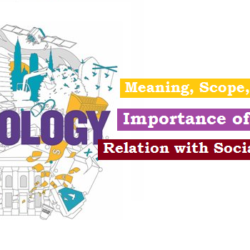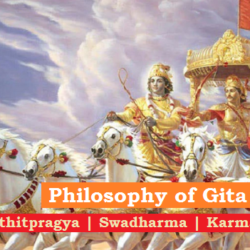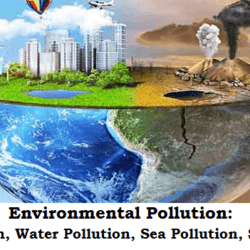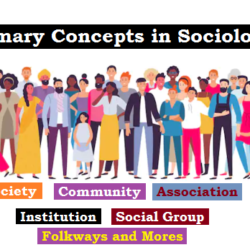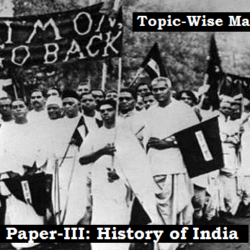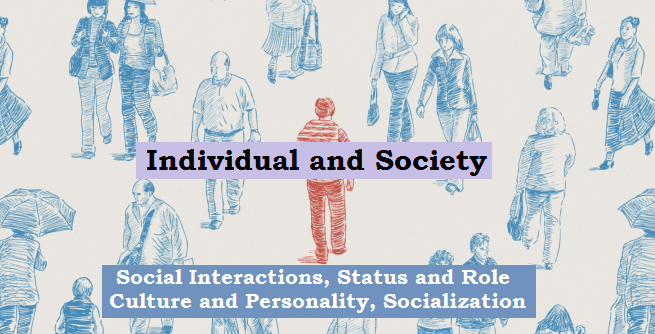
Social Interactions
A social interaction is an exchange between two or more individuals and is a building block of society.
Social structures and cultures are founded upon social interactions. By interacting with one another, people design rules, institutions and systems within which they seek to live. Symbols are used to communicate the expectations of a given society to those new to it, either children or outsiders.
Thus interaction is the basic ingredient of social relationships. The two essential conditions of social interaction are: social contact and communication.
Status and Role
Status: A position occupied by an individual in a social system with defined rights and duties
Role: Expected behaviour pattern attached to a status, carrying certain rights and obligations
Each status typically includes a number of roles. For example, a teacher has different roles towards his students, fellow teachers and his principal. Similarly, a doctor in a society has both a status and a role to perform. He is perceived as a protector and a person who is honored by the society because of the role he performs.
Characteristics of Status:
- It’s a result of need and interests of society.
- It is relative in its existence (e.g. there would be no judge without judiciary).
- It has certain privileges and immunities.
- It has some degree of prestige.
Types of Status:
- Ascribed Status: assigned at birth
Bases of ascribed status are: sex, caste, race, etc
- Achieved Status: chosen or achieved through efforts
Bases of achieved status are: education, wealth, training, friendship, etc
Achieved Vs Ascribed Status
| Achieved Status | Ascribed Status |
| 1. It is achieved by an individual on merit and effort. | 1. It is assigned to us on the basis of birth, biological inheritance, parents’ status etc. |
| 2. It is based on individual’s choice. | 2. A person does not choose this status. |
| 3. It can be changed by qualifications, income etc. | 3. It is difficult to change status. |
| 4. It plays an important role in modern societies. Eg. Class | 4. It plays an important role in traditional societies. Eg. Caste |
Characteristics of Role:
- It is a dynamic aspect of status.
- It can’t be isolated from status.
- It has a strong cultural aspect.
Status Vs Role
| Status | Role |
| 1. Status is a position occupied by an individual in a social system. | 1. Role is an expected behaviour pattern attached to a status. |
| 2. Status is occupied. | 2. Role is played. |
| 3. A status can have many roles attached to it. | 3. A role is a particular behaviour pattern attached to a status. |
Role Conflict: When there is incompatibility among roles corresponding to multiple statuses, it is referred to as role conflict. It occurs when contrary expectations arise from two or more roles to be performed.
For example, a supervisor at a factory may feel strain due to her role as friend and mentor to the subordinate employees, while having to exhibit a stern and professional watchful eye over the employees.
Culture and Personality
Culture: A way of life in which all members of society participate which includes beliefs, customs, art, law or other habits acquired by man as a member of the society.
Dimensions of Culture:
- Cognitive aspect: learning by what we hear or see, e.g. customs
- Normative aspect: rules of conduct, e.g. folkways, mores, conventions, laws
- Material aspect: activity by tools or machines, e.g. mobile, car, computer
Cultural Lag: The gap emerged when material aspect of culture changes at faster pace than the non-material aspects (cognitive and normative).
Characteristics of Culture:
- Culture is learned: It is not biological; we do not inherit it. Much of learning culture is unconscious. We learn culture from families, peers, institutions, and media.
- Culture is shared: As we share culture with other members of our group, we are able to act in socially appropriate ways as well as predict how others will act.
- Culture is based on symbols: Language, money and art are all symbols. They only have meaning when people in a culture agree on their use.
- Culture is integrated: Various parts of a culture being interconnected.
- Culture is dynamic: All cultures change, otherwise, they would have problems adapting to changing environments. Because most cultures are in contact with other cultures, they exchange ideas and symbols.
Personality: The term personality is derived from the Latin word persona meaning a mask or character. Personality can be defined as an individual’s characteristic pattern of thought, emotion, and behaviour.
Factors affecting Personality formation:
- Environment: humans come to form ideas and attitudes where they live in.
- Heredity: Some set of biological needs and capacities are inherited by human group in every society.
- Culture: Personality is an individual aspect of culture while culture is a collective aspect of personality. The ideas and behaviour of the individuals are largely the results of cultural background.
- Situational experiences: The overall process of socialization; ranging from social rituals to table manners to getting along with others are consciously inculcated in the child by the parents.
Relationship between Culture and Personality:
Culture plays a valuable role in personality development. Many Sociologists considers personality as an individual aspect of culture while culture is a collective aspect of personality. The ideas and behaviour of the individuals are largely the results of cultural background.
The culture furnishes the raw material of out of which the individual makes his life. The social institutions of the particular society affect the personality of the group members. In every society from the moment of birth, the child is treated in such ways which shape his personality. Every culture applies a series of general influences upon the individuals who grow up under it.
Socialization
It’s a process by which we learn and internalize the norms and ideologies of a society.
Through socialization, we adopt the socially accepted behavior by learning its norms, attitudes, values, customs, etc. Socialization takes place at different stages such as primary, secondary and adult.
Agents of Socialization:
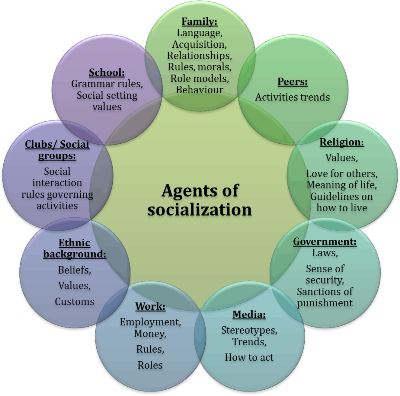
Characteristics of Socialization:
- It inculcates basic discipline: through socialization, a person learns to control his impulses. He may show a disciplined behaviour to gain social approval.
- It helps to control human behaviour: through socialization, society intends to control the behaviour of its-members unconsciously.
- It takes place formally and informally: formally in schools, colleges and informally in family, peers, etc.
- It is a continuous process: Socialization is a life-long process. Internalization of culture continues from generation to generation.
Types of Socialization:
- Primary Socialization: of the young child in the family
- Secondary Socialization: in the school and peer groups
- Adult Socialization: brings changes in views and behaviour in career or family (after marriage)
- Anticipatory Socialization: learning the culture of a group with the anticipation of joining that group
- Re-socialization: discarding former behaviour patterns and accepting new ones (e.g. when a criminal is rehabilitated, he has to change his role radically.)
Stages of Socialization:
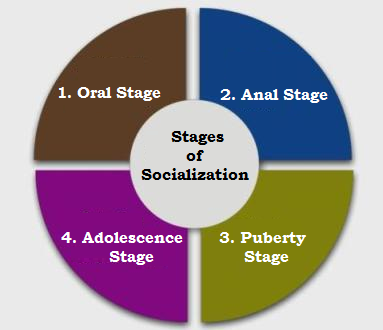
- The Oral Stage:
- Begins at birth till the age of 1.
- Purpose is to establish an oral dependency.
- By his cries he is able to build up fairly definite expectations about feeding time and also about his pressing needs for care.
- At this stage, the baby does not seem to internalize any role at all.
- The Anal Stage:
- It begins soon after the first year and extends up to the third year.
- This period is called anal stage because toilet training is the main focus of attention of the socializing agent, particularly mother.
- During this stage, the child internalizes two roles his own and that of his mother.
- During this stage, the child is taught as to how to discriminate between ‘correct’ and Incorrect’ behaviour, through rewards and punishments.
- The Puberty Stage:
- It extends from the fourth year to puberty, (i.e., age of 12 or 13).
- In the course of the third stage, the child becomes a member of the family as a whole. He identifies himself with the social role ascribed to him on the basis of his biological sex.
- The Adolescence Stage:
- It begins roughly at puberty.
- At this age, the young boy or girl has a tendency to get away from parental control. (‘Crisis’ of this stage)
- The strain involved in transition during the adolescent period depends upon the cultural definition of adult roles.


 Home
Home Syllabus
Syllabus Contact Us
Contact Us
